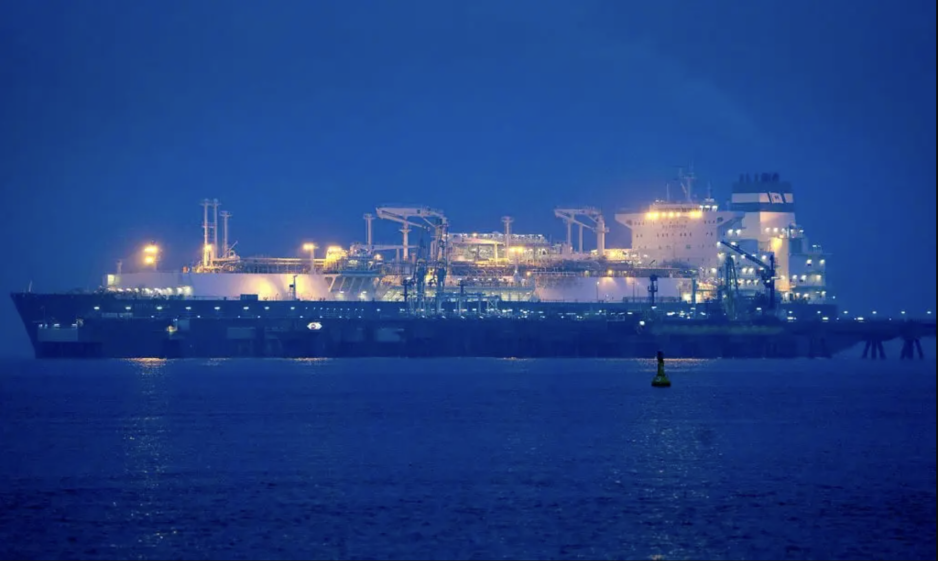EU Countries Spent Close to €7bn on Russian LNG in 2024

Höegh Esperanza floating LNG import ship at Germany’s Wilhelmshaven LNG terminal.
Europe cannot shake its addiction to Russian liquefied natural gas. Throughout 2024 EU members purchased liquefied gas from Russia worth almost €7bn. Some member states continue to spend more on their purchases of Russian LNG than they provide in military aid to Ukraine.
A new report on the European Union’s liquefied natural gas (LNG) sector paints a damning picture of the continent’s continued reliance on and purchases of Russian LNG. In total EU member states purchased supercooled gas worth close to €7bn throughout 2024, the report, released by the Institute for Energy Economics and Financial Analysis (IEEFA), an independent global think tank, estimates.
The think tank’s European LNG tracker also highlights that the EU’s greater reliance on renewable energy and demand reduction policies have allowed the bloc to reduce LNG imports by 16 percent in 2024.
However, that overall demand reduction did not translate to reduced imports from Russia. Throughout 2024 deliveries from Russia grew by 18 percent. LNG represents a continued source of revenue for the country’s war efforts.
The 2024 figures bring the total the bloc has spent on Russian LNG since the beginning of the war to more than €30bn, based on industry reporting.
More for Russian LNG than military aid
Key markets remain France, Belgium, and Spain, accounting for 85 percent of Russian LNG imports, with smaller amounts flowing into the Netherlands and Greece.
“France spent an estimated €2.68 billion on Russian LNG [in 2024], more than any other EU country,” said Ana Maria Jaller-Makarewicz, lead energy analyst, Europe, at IEEFA. Belgium and Spain purchased LNG in the amount of €930 million and €1.84 billion respectively.
While not part of IEEFA’s report, these figures highlight how some EU member states continue to spend similar amounts or in some cases more on their purchases of Russian LNG than they provide in direct military aid for Ukraine.
France’s military aid contributions for Ukraine over the three-year period since the beginning of the war total €6 billion; compared to €2.68 billion in Russian LNG purchases in 2024 alone.
The figures are similarly skewed for Belgium and Spain. Spain’s military aid contributions total €570 million since February 2022, compared to Russian LNG purchases of €1.84 billion last year.
Belgium’s Zeebrugge terminal is of particular importance to Russia’s LNG operation, the report details. It is here where several million tons of LNG are transferred and re-exported to the global market.
“Belgium’s Zeebrugge terminal, which is part publicly owned, received more Russian LNG than any other European terminal in 2024, including transshipments to other countries and imports into Belgium,” continued Jaller-Makarewicz.
Will the transshipment ban succeed
In theory upcoming EU legislation aims to put a stop to this practice, however, at the risk of even more Russian LNG remaining in Europe.
“As the EU’s transshipment ban comes into effect in March 2025, will these cargoes find new European buyers in 2025?,” asked Jaller-Makarewicz.
European buyers of Russian LNG frequently point to long-term contracts they can not default on as an explanation for the continued imports. However, the share of Russian LNG traded on the spot market, i.e. without any preexisting or binding offtake agreement, has been steadily growing. A clear indication that Russian LNG remains an attractive value proposition to traders.
“A third of EU imports of Russian LNG were spot trades in 2024. Member states should prioritise phasing out these flows, which aren’t subject to long-term contracts,” explained Jaller-Makarewicz.
The report also notes how the UK has decreased its LNG imports by 47 percent in 2024, more than any other European nation. The country was also the first to step away from Russian liquefied gas banning its import at the start of 2023.

